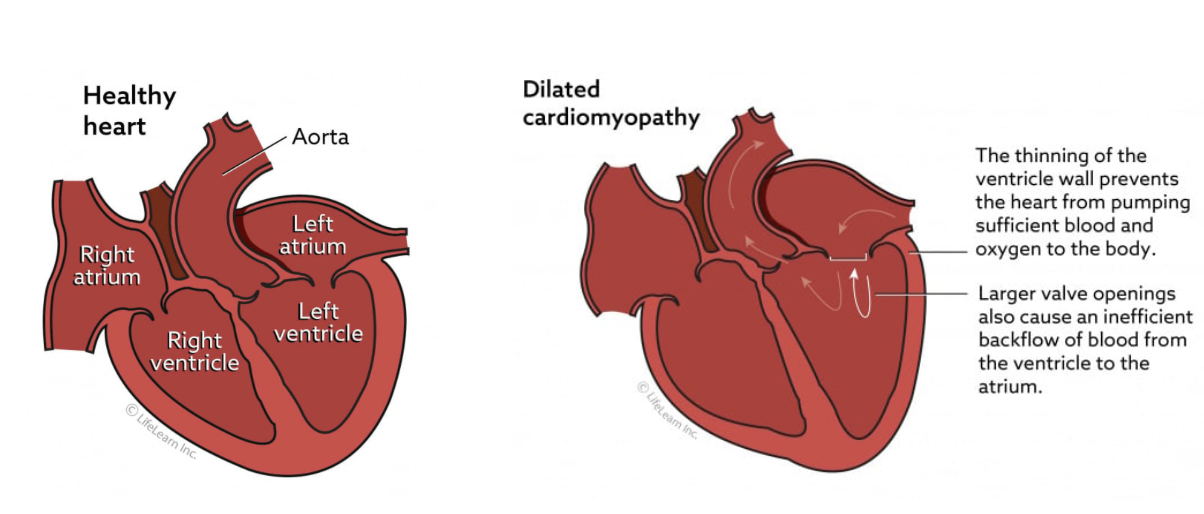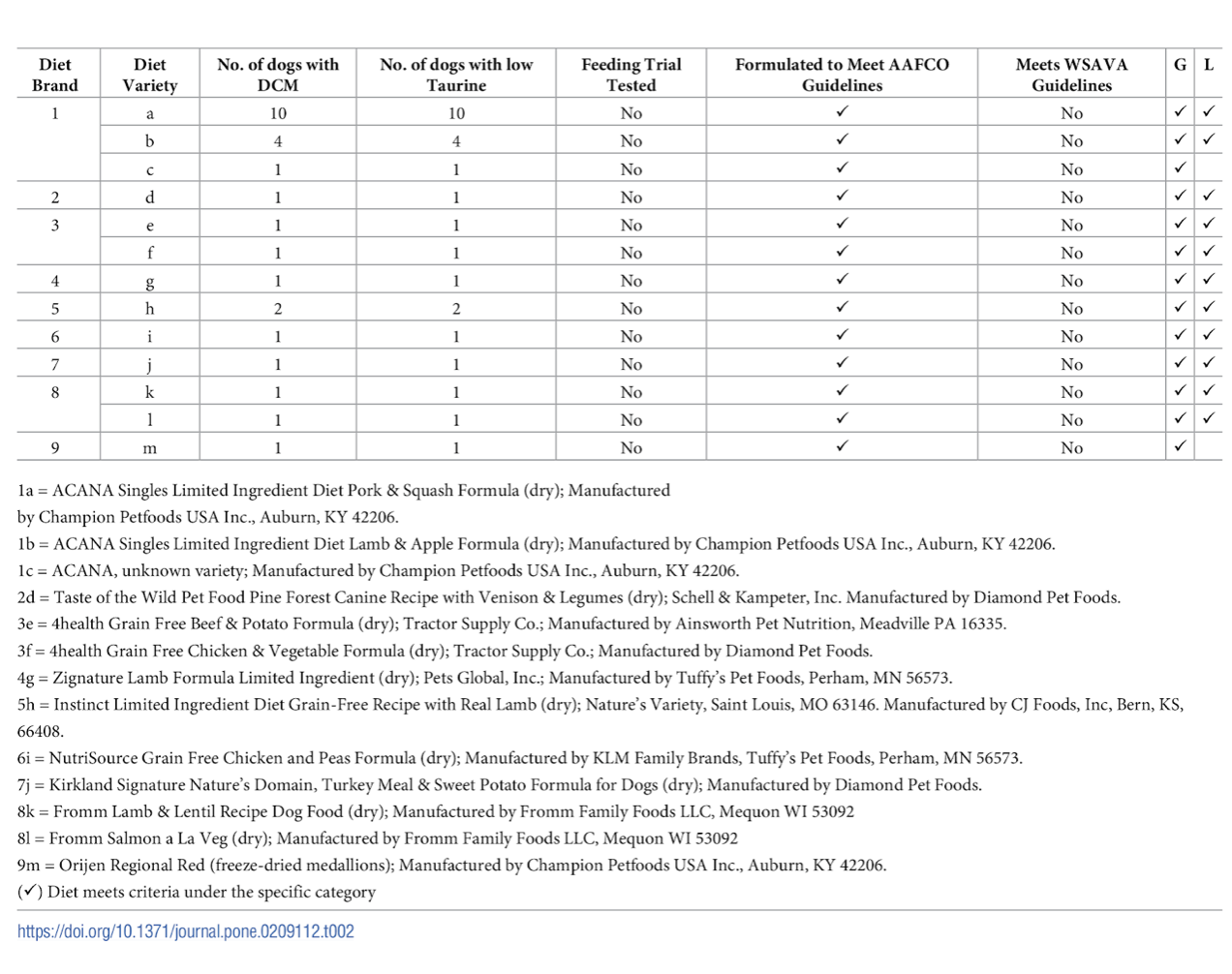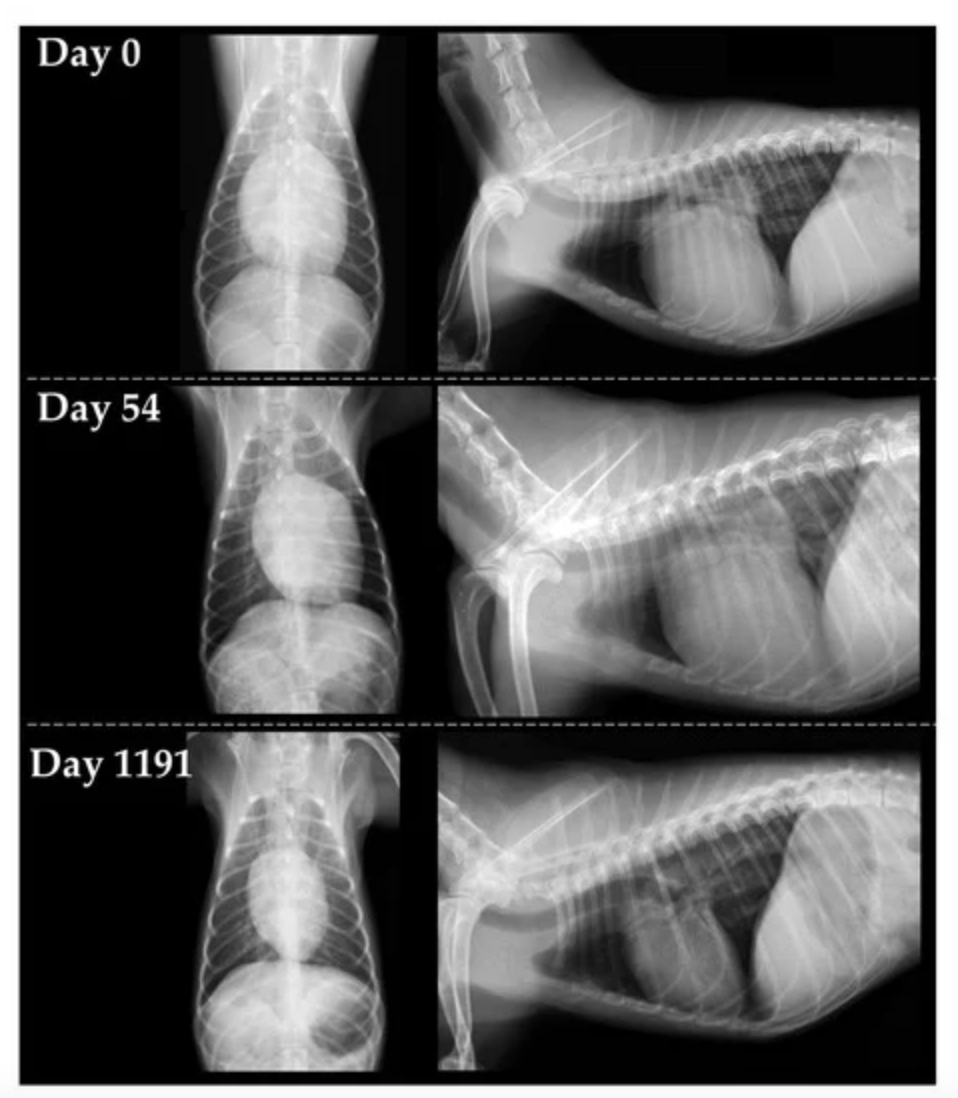Hi everyone, I wanted to post an update on the grain free diet issue in dogs. This one is going to get into the nitty gritty of the research that has been ongoing for the past five years. A very comprehensive update was recently released by the Clinical Nutrition Service at The Cummings School of Veterinary Medicine at Tufts University. Tufts has a really nice nutrition blog called Petfoodology which has a wealth of information about diets for dogs both in general and for dogs with special health conditions – I highly recommend you check it out. They have been posting summaries and updates of the grain free food concerns and research as it has unfolded. For a brief summary – the veterinary community became aware that there was a higher than usual incidence of a certain type of heart disease called dilated cardiomyopathy in dogs that were eating boutique grain free diets starting back in 2018. Dilated cardiomyopathy means that the heart becomes very large and the walls become very thin as it stretches out so it has a lot more trouble pumping – dogs can go into heart failure from this as their heart gets weaker and weaker. There are a few breeds that have a genetic predisposition to this type of heart disease, but the concern was that veterinarians were seeing it in young dogs that were either mixed breed or not breeds that typically get this kind of heart disease.
Information about dilated cardiomyopathy:
https://vcahospitals.com/know-your-pet/dilated-cardiomyopathy-dcm-in-dogs–indepth
(Images by LifeLearnInc.)
The most recent update from Tufts came out on February 7th, 2023 and I’m not going to try to paraphrase it because it’s perfectly laid out as is, so here is the link to it:
As some background to how we got here, here are some earlier articles that pave the way for this one:
2018: https://vetnutrition.tufts.edu/2018/11/dcm-update/
2019: https://vetnutrition.tufts.edu/2019/07/dcmupdate/
2021: https://vetnutrition.tufts.edu/2021/09/diet-associated-dcm-research-update/
December 2018: veterinarians from the veterinary programs at Tufts University, UC Davis, University of Illinois, and North Carolina State University released a joint commentary that was published in the Journal of the American Veterinary Medical Association:
https://avmajournals.avma.org/doi/pdf/10.2460/javma.253.11.1390
The New York Times and the Washington Post are just a couple of the more mainstream news sites that have picked up on the story:
https://www.nytimes.com/2018/07/24/health/grain-free-dog-food-heart-disease.html
The FDA has a “Questions and Answers” page that was updated 12/23/22:
And on December 13th, 2018 a study by Kaplan et. al titled “Taurine deficiency and dilated cardiomyopathy in golden retrievers fed commercial diets” was published that looked at the echocardiograms, blood taurine levels, diet, and medical histories of 24 golden retrievers that had dilated cardiomyopathy and were taurine deficient, and 52 healthy golden retrievers. It is a very dense article, so I pulled out the table that lists the specific brands that were looked at in this study: https://journals.plos.org/plosone/article?id=10.1371/journal.pone.0209112
Table 2. List of pet food brands with their diet varieties and characteristics.
The study concluded that there may be a genetic component in some dogs that predisposes them to being more susceptible to getting dilated cardiomyopathy when they eat a diet with low available taurine. Note that I said low AVAILABLE taurine – a diet may have taurine in it, but the taurine may not be available to the body because of the way the diet is formulated, cooked, or processed. Currently the research is indicating that there seems to be a potential issue in foods made with certain pulses in the legume family – peas, lentils, chickpeas, and dry beans (but not soy, which is also a legume). This is why it is so important to have feeding trials.
There have been multiple studies that show that if the dilated cardiomyopathy is diet-induced, it can sometimes be reversed by putting the dog on a grain inclusive diet. One such study is linked below – the figure of xrays from a dog on a grain-free diet with a large heart prior to treatment (top), then a still-large heart after 54 days of treatment with cardiac meds and supplemented taurine (middle), then a much improved heart after the diet was switched to one that was grain inclusive at day 1191 (bottom).
“A Case of a Small-Breed Dog with Diet-Related Dilated Cardiomyopathy Showing Marked Improvements in Cardiac Morphology and Function after Dietary Modification” by Saito et.al
Vet. Sci. 2022, 9(11), 593; https://doi.org/10.3390/vetsci9110593
The blog author at Tufts and the nutritionists doing research on this at Tufts and other places like UC Davis are all board-certified veterinary nutritionists. This indicates a veterinarian who went through vet school, decided to do a residency in nutrition, take and pass a national board exam to qualify for certification, and may additionally have a PhD in nutrition like Dr. Lisa Freeman (the author of these articles). Each of these nutritionists have literally had over a decade of education specifically in the area of animal anatomy and physiology, medicine, and nutrition. These are the people I want formulating the food that my dogs eat. Companies such as Hills, Purina, and Royal Canin employ a number of these nutritionists to help formulate their food. They also make sure that their food meets WSAVA guidelines, which are the highest standards that a pet food can be held to. I’ve included the link below, but basically they try to make sure foods are not only nutritious on paper, but the nutrients in the food are actually available to your cat or dog for their bodies to absorb after cooking or processing and are well balanced/provide everything they need in real life.
https://wsava.org/wp-content/uploads/2020/01/WSAVA-Nutrition-Assessment-Guidelines-2011-JSAP.pdf
In conclusion, we likely won’t be recommending grain free diets until this issue has become clearly understood and remedied. If you think your dog or cat has an allergy to grain, or needs a grain free diet for another reason, please call and discuss with your vet before making a change that could potentially have serious long-term consequences. Trust science and research over clever marketing campaigns. If you are interested in discussing your cat or dog’s dietary needs with a veterinary nutritionist we can help you find one that you can do a consultation with – Tufts has the closest physical nutrition department that you could visit in person, but there are many nutritionists who offer telemedicine consultations.
Our final installment of this Care and Feeding series will address obesity in dogs and cats, another really important issue that is very important to both immediate health and longevity.
–Dr. Dana Muir



